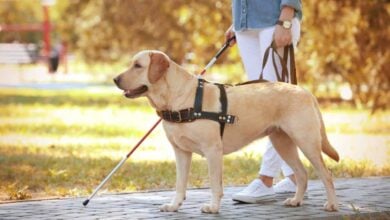German Shepherd Breed Information: Traits, Facts & More
When you purchase through links on our site, we may earn a commission. Here’s how it works.
The handsome, noble German Shepherd is a member of the herding group. The German Shepherd Dog (GSD) is a breed that has found its place in just about every niche, from the family dog to a working service dog. Just what is it that makes the German Shepherd such a good candidate for so many varied activities? Is it their loyalty, confidence, courage, or ability to learn? I am excited to introduce you to this amazing breed. Let’s take a deeper look at the German Shepherd’s history, appearance, temperament, and needs.
Table of Contents
History Of The German Shepherd
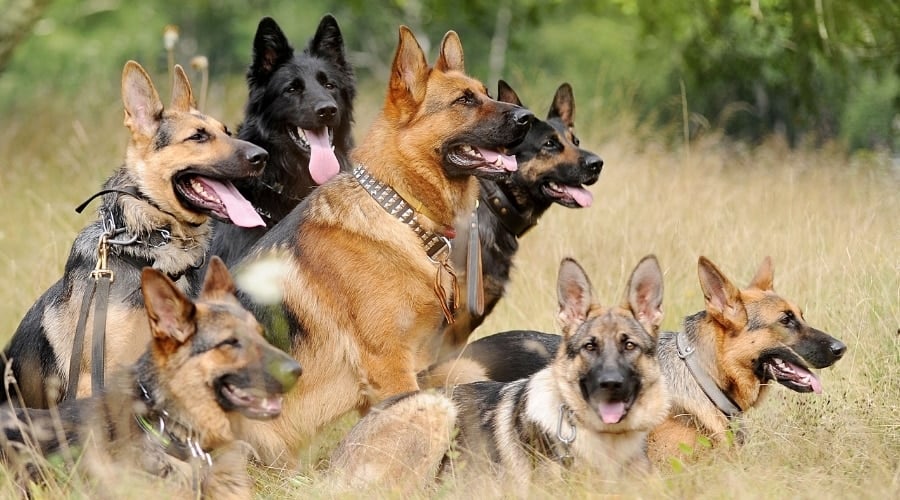
German Shepherds have been around for quite a long time and come from, you guessed it, Germany. Although initially used as guard and herding dogs, their intelligence and friendliness have made them very popular pets. They are now bred widely in the United States, but there are differences between German Shepherds of European lines vs. American lines.
The first German Shepherd was presented at Hanover, Germany, in 1882 after being bred in Karlsruhe. The objective was to produce a dog that was as handsome as it was responsive and obedient. Many different breeds combined to create the German Shepherd, including various local farm and herding dogs. The sheer variety in coat length and texture resulted in variation along the Shepherd lines. Originally, the Shepherd had longer hair, and in 1889, the first short-haired Shepherd was presented in Berlin.
The first dog officially recognized as a German Shepherd was registered in April 1899 by Captain Max von Stephanitz. They continued to be shown as a wire-haired and a long-haired breed up until 1915. These days, only the short-haired German Shepherd is shown. In 1908, the German Shepherd became an American Kennel Club (AKC) recognized breed in the herding class.
The breed’s popularity fluctuated during World Wars I and II, as the name German Shepherd was associated with an enemy. For a brief time, the breed was called the Alsatian. Owners of the Shepherd commonly lied about the breed to keep them safe.
By the ’60s, the GSD’s popularity increased once more. By 1993, the German Shepherd became the third most popular breed, and most recently, in 2023, the AKC ranked the GSD as the fourth most popular breed. It is common to see this breed take the top five spots on dog registries worldwide.
The German Shepherd ranks among the most favorite family dogs, along with the ever-popular Labrador Retriever, French Bulldog, and Golden Retriever.
Temperament
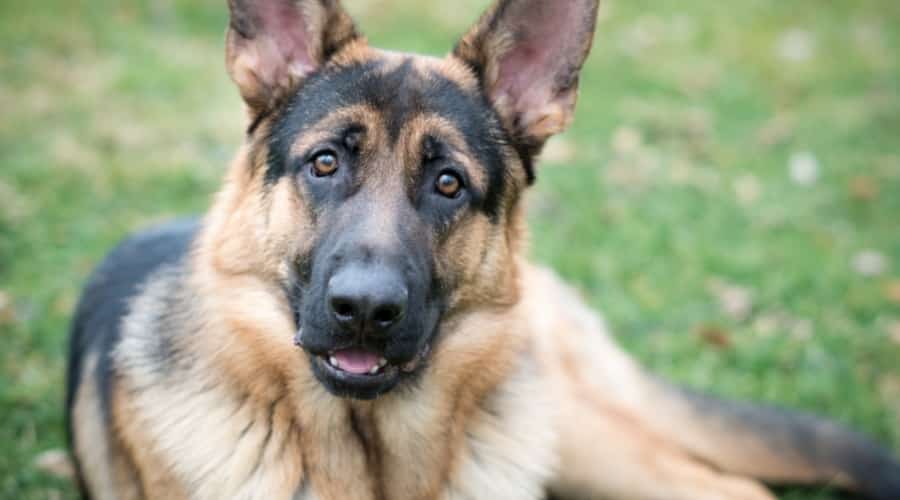
German Shepherds are natural guardians, make incredible family pets, and are popular as police dogs. They are intensely loyal to their families and often place themselves in harm’s way before they let a family member get injured.
Humans have to earn the trust of a German Shepherd, as they can be aloof and wary of strangers. A German Shepherd will default to a “guard dog” if it is believed their family is in danger. Because of this, they can appear to be unfriendly or even hostile.
If you want your German Shepherd to be well-behaved around guests, it is important to socialize them early through interactions with other animals, kids, and even babies. These pups are easy to train, but it is vital to educate them early and consistently.
Barking is how dogs communicate, and German Shepherds are inherently chatty. They will bark when bored or to alert you if something is awry. Proper mental stimulation, plenty of exercise, and training can help keep barking at a minimum.
These intelligent dogs were born workers, so they act their best when they have a job to do. This can be as intense as working as a military or police dog or as simple as solving a puzzle to get a treat. When in the comforts of their own home and family, German Shepherds will share their silly side by flopping around and tossing toys in the air.
Size & Appearance
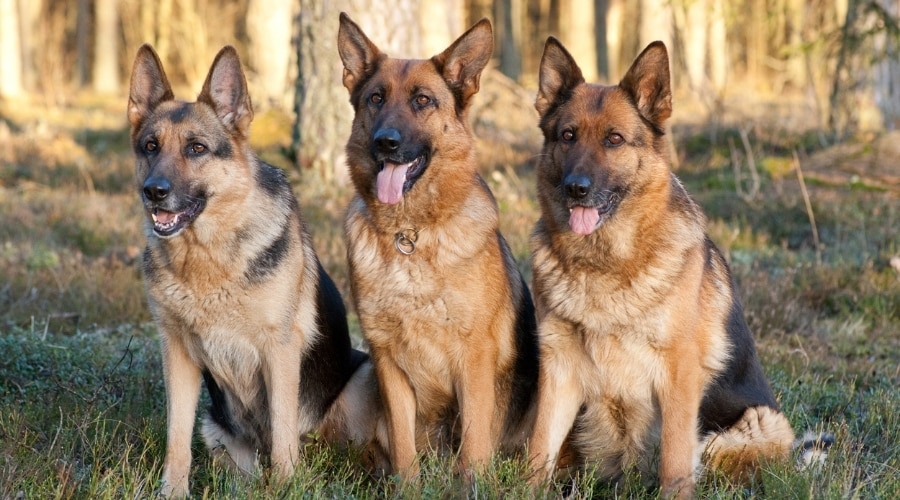
German Shepherds are big dogs! An adult German Shepherd can grow to between 22 to 26 inches at the shoulder, weighing in at between 50 to 90 pounds. Female German Shepherds are generally smaller than their male counterparts. View our German Shepherd growth chart to learn more.
During the first few months of puppyhood, German Shepherds have soft, floppy ears. At about five months old, they will open toward the front and become more erect. They have long, straight muzzles that finish with black, square noses. Their intelligent and eager expression is made with dark, almond-shaped eyes.
These massive creatures have a long torso that slopes toward the back; their hind legs are shorter than the front. This causes hip problems for German Shepherds later in life. A long, bushy tail with a slight hook, like a saber, serves as the caboose for this canine.
Coat & Colors
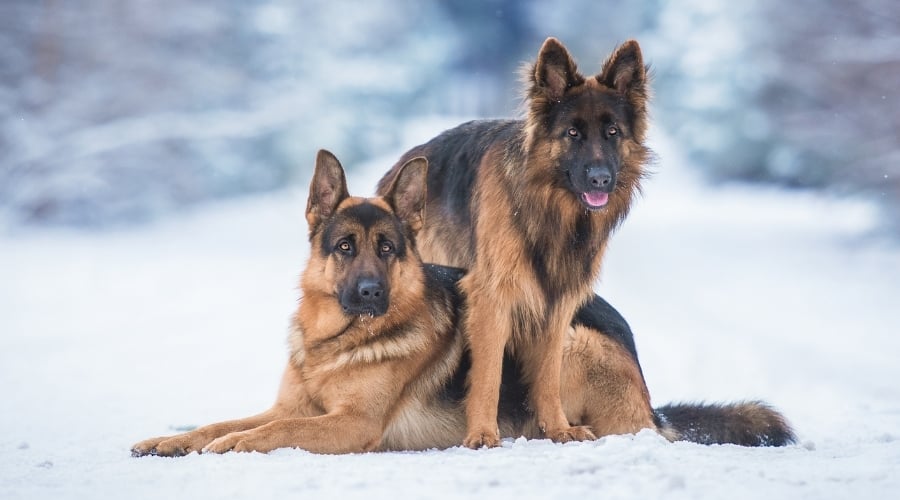
Most German Shepherds are basically black and tan. However, you can also find solid black German Shepherds and sable-colored ones.
You may see puppies with white coats, liver-colored, or blue coats. These pups are often advertised as “rare” and are consequently for sale at high prices. Don’t be fooled. If you want to show your German Shepherd, these colors are frowned upon and won’t win you any prizes.
A type called a Panda German Shepherd is recognized in a few instances. This is a piebald-colored dog with 35% white coloration, and the remaining coat is black and tan. The interesting thing about the Panda Shepherd is that there is no White Shepherd in the dog’s bloodline.
The German Shepherd is double-coated. That means the dog has a fluffy undercoat that has evolved to keep him warm in the cold mountain environment where the breed initially worked.
The German Shepherd’s outer coat is straight, dense, and coarse. These flat “guard” hairs lay close to the dog’s body, providing a layer of water-repellent fur. The undercoat is soft, fluffy, and thicker than the guard coat.
German Shepherds have four specific coat lengths:
- Long with an undercoat
- Short with an undercoat
- Medium with an undercoat
- Long without an undercoat
German Shepherds with undercoats shed moderately all year round.
Are German Shepherds Hypoallergenic?
Because of the amount of shedding that occurs with a German Shepherd, they are not hypoallergenic. If you need a dog that won’t trigger your allergies, our experts guide you in our article about non-shedding dogs.
Exercise & Living Conditions
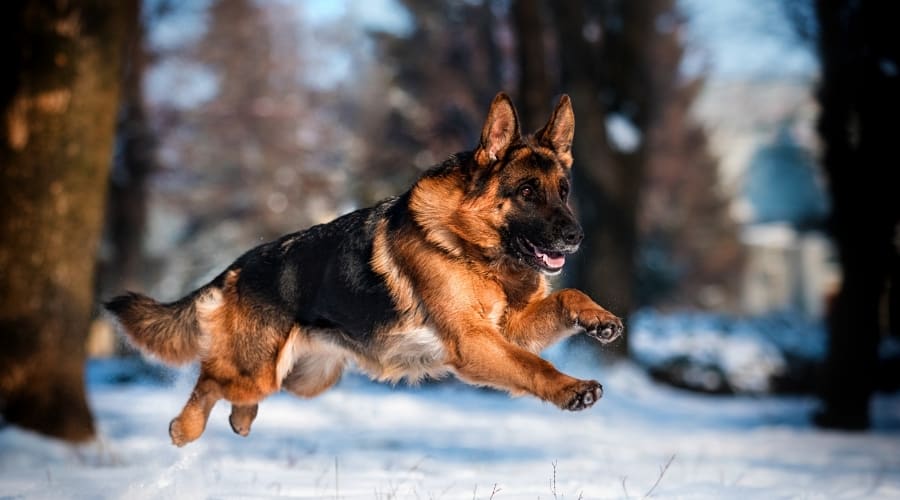
A German Shepherd needs plenty of exercise, both to keep him in good physical condition and to stimulate him mentally. If you’re an outdoorsy family, a German Shepherd could be the perfect companion for you.
These dogs love long walks and games of fetch with a ball or Frisbee. You’ll need to make time to give your German Shepherd two good walks every day and include a couple of playtime sessions. If you were wondering how fast can a German Shepherd run, the answer is up to 30 mph. This means they are wonderful jogging, hiking, and adventure companions.
If you’re curious about how much exercise your dog gets daily, consider getting a dog activity tracker.
Maybe you are also asking, do German Shepherds like water? Or can German Shepherds swim? While they are certainly capable of learning to swim, they don’t always take to water naturally.
In theory, a German Shepherd could live outside your home as long as you provide him with a waterproof, well-ventilated, cozy dog crate. The breed has a double coat with fluffy underfur that will keep your pup warm in winter.
However, German Shepherds are fiercely loyal to their human families, and your pup may become stressed and feel isolated if he’s separated from you. So, although a German Shepherd could live outside, he would much prefer to stay with you indoors on a cozy dog bed.
Training- Are German Shepherds Smart?
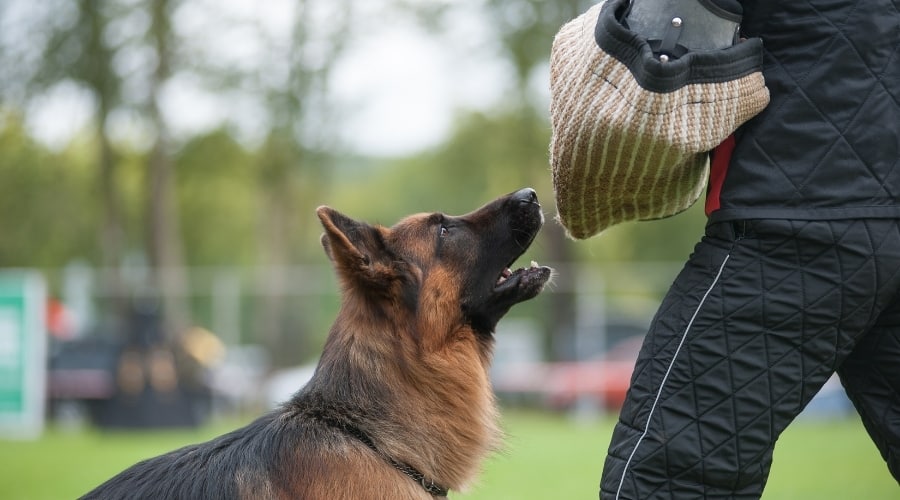
According to the author of “The Intelligence of Dogs,” Stanley Coren, Ph.D., ranks the German Shepherd as the third smartest dog breed. This study examined more than 100 dog breeds as they were judged by 200 dog obedience judges while learning new commands. Dogs were ranked based on their ability to perform commands 95% of the time or better based on less than five command repetitions.
The incredible level of intelligence in the German Shepherd, a level only bested by the Border Collie and the Poodle, makes this breed incredibly versatile. An ability to quickly pick up new commands and an intense desire to please its master means that this breed is the perfect candidate for any number of professional positions available to canines. This trait is perhaps why this is the breed of choice for both military and police work worldwide.
When they’re serving professionally, the German Shepherds can participate in police work, guard dog work, sheepdog work, service dog work, military work, and search and rescue work. They also frequently participate in dog sports, including obedience, tracking, flyball, ring sport, and agility.
The athletic, brave, and super-versatile German Shepherd still works in many different occupations today. The breed is widely used by the police and military, provides assistance and guidance to people with disabilities, and works as a search and rescue dog. Some Shepherds are trained as detection dogs, searching for contraband, drugs, and illegal stowaways. They excel in virtually all canine sports, including tracking, rally, agility, obedience training, dock diving, and flyball.
Training Your German Shepherd
German Shepherds are highly trainable and soak up new information like sponges. It’s a good idea to take your puppy to training classes as soon as he’s old enough and consider the use of a training collar. German Shepherds are big dogs, and you want yours to be obedient from the word go. You’ll want to start early so you can avoid them becoming nervous and engaging in bad behavior.
Because they are adept at learning new skills and are such hard workers, they are often used as law enforcement or search and rescue dogs like their distant cousin, the Belgian Malinois. They are also often compared to other dogs like the Doberman and also compared to the Rottweiler, which are both guard dogs in nature.
The GSD is a huge chewer. Part of this comes during the puppy stage when teething happens. This is normal in all puppies, of course, but German Shepherds are especially bad at it. Not only does teething hurt, but chewing relieves that discomfort. This breed has it in its nature to chew. Their sharp teeth and strong jaws are a result of their wolf ancestry, making it their instinct to work, gnaw, and tip things apart.
It’s a part of their nature to survive. They need to maintain strong bites and sharp teeth, and chewing and gnawing help them accomplish this. For that reason, it’s important to get the right toys to feed this instinct and keep your pup happy. Learn more in our reviews of the best indestructible dog toys.
When considering how to train a German Shepherd, it’s important to remember that this breed will not respond well to harsh training techniques or punishment. (Doggy Dan is an excellent resource for online training videos that you can do yourself.) Also, training this breed has a lot to do with your role as an owner.
German Shepherd Health
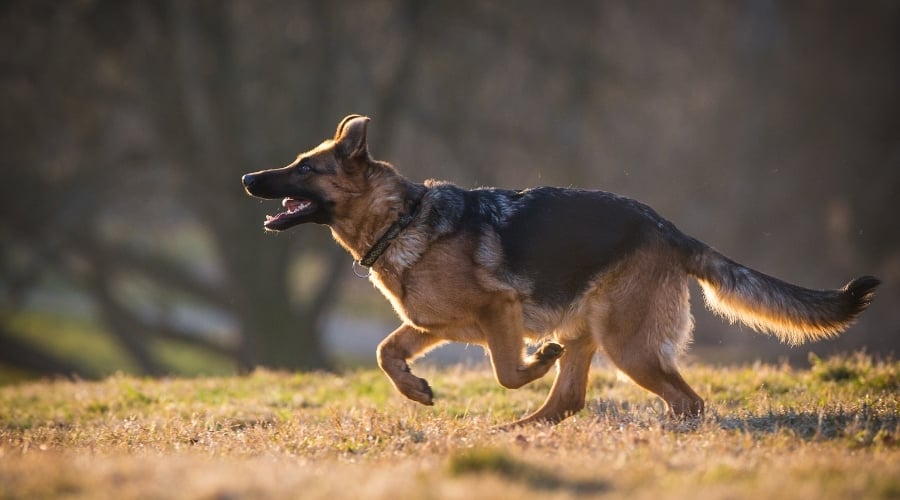
From The Veterinarian
While German Shepherd Dogs (GSDs) are a popular breed, they are also one that is sadly plagued with health issues. One of the most common ones that I see in practice is osteoarthritis. This can be seen as general ‘wear and tear’ in older age but often occurs as a secondary problem to conditions like hip dysplasia. Hip dysplasia is a hereditary issue, meaning that affected parents are likely to pass the trait on to their offspring. Screening the parents before mating (by hip-scoring them) can help reduce the chances of this, but it is no guarantee.
Anal furunculosis is another problem that this breed is prone to. In affected dogs, the anus becomes inflamed, ulcerated, and extremely painful. It is unknown exactly what causes this condition but it commonly affects middle-aged to older GSDs, progressing and worsening with time. Immunosuppressive treatments can help some of these animals.
GSDs are also at risk from gastric dilatation-volvulus (GDV) a condition whereby the stomach bloats and becomes twisted on itself. This is an emergency and is one of the most serious health complaints that a dog can suffer from. I have seen cases of this in German Shepherds that have sadly not survived the corrective surgery due to the damage to their stomach tissue. Signs of GDV include drooling, retching, trying to vomit unsuccessfully, a bloated and painful abdomen, restlessness, and collapse. You must seek immediate veterinary help if you think your dog has this condition, as treating it promptly could save your dog’s life.
– Rebecca MacMillan, BVetMed BSAVA PGCertSAM MRCVS
The average lifespan for a German Shepherd is between 10 and 13 years, although many live longer. Despite being robust and resilient dogs, German Shepherds can be prone to several health problems, including:
- Hip dysplasia
- Elbow dysplasia
- Degenerative myopathy
- Heart disease
- Canine bloat
- Eye problems
- Epilepsy
- Bleeding disorders
- Hemangiosarcoma
- Exocrine pancreatic insufficiency
- Immune-mediated diseases
- Dwarfism
- Allergies
- Von Willebrand’s disease
- Perianal fistulas
Hip Dysplasia
Hip dysplasia is an inherited condition where the head of the thigh bone does not fit correctly in the hip joint socket. Eventually, the bone starts to wear away, ultimately causing painful arthritis.
Canine hip dysplasia can be managed with medication, and there is also a surgical treatment option. However, surgery is not always successful and will also cost you many thousands of dollars. Consider pet insurance for your German Shepherd to help with vet costs. It’s helpful for older dogs with the potential to develop hip dysplasia to be put on glucosamine-rich food.
Degenerative Myelopathy
Degenerative myelopathy is a similar condition to multiple sclerosis in people. The disease causes a slow-onset paralysis of the dog’s hindquarters. Degenerative myelopathy is untreatable, although the progress of the disease can be slowed down with drugs. Eventually, an affected dog will lose his mobility altogether, and ultimately, the only option is euthanasia.
Heart Disease
As is the case with many of the large breeds, German Shepherds can be affected by a whole range of heart diseases, including enlarged hearts, heart murmurs, and valve diseases. For that reason, you should have your vet examine your German Shepherd’s heart as part of an annual health check for signs of problems.
You should always ask the breeder for details of your puppy’s parents’ and grandparents’ health certification. Many of the health problems that affect German Shepherds are inherited, so it’s vital you know that your pup’s parents have been tested and are clear of these conditions.
Temperament is also hereditary. A German Shepherd with an aggressive, unbalanced temperament is a very dangerous animal, so be sure to ask if your puppy’s parents hold a “TT” certificate issued by the American Temperament Test Society.
Before a German Shepherd can be included in the Canine Health Information Center database, he’s required by the German Shepherd Dog Club of America to hold elbow and hip certification from the Orthopedic Foundation for Animals, and he must also have GSDCA temperament test scores on file. Optional CHIC tests include thyroid and cardiac evaluations, too.
Note that the thyroid tests on the puppy’s parents must have been carried out within the past 12 months, and the eye examination within the last two years. Check out the CHIC website to see if your puppy’s parents are listed there.
Pet Insurance Testimonial
German Shepherd Dog: Toby
Pet Parent: Charlotte
Illness/Injury: MRI and Surgery
Fetch Reimbursement: $4,641
We have covered our GSD, Toby, with a Fetch policy for eight years. They have consistently covered every illness and injury. Our GSD has several illnesses (conjunctivitis and osteoarthritis) that are lifetime illnesses. Fetch has paid every covered claim, every year, for each lifetime illness. All I do is provide a completed claim form, medical records, and my invoice. There has never been a delay in processing a claim.
Most recently, we consulted with a surgeon for a potential hip replacement. The surgeon quickly identified that there was something very wrong with Toby’s spine—Toby was having slight difficulty walking. An MRI was scheduled for the following week. The morning of the MRI, Toby was unable to move his backend. The MRI was immediately reviewed and it was discovered that Toby had an intervertebral disk extrusion at T13-L1 that would require immediate surgery—if Toby was to ever walk again. Without hesitation, we consented to the surgery.
He is now three weeks post-surgery. Recovery is slow but promising. Rehab has begun — hydro-therapy (water treadmill) twice a week and laser therapy for his hips once a week. I filed the first claim for this medical emergency (MRI and surgery) and Fetch paid $4,641.

Nutrition For Your German Shepherd
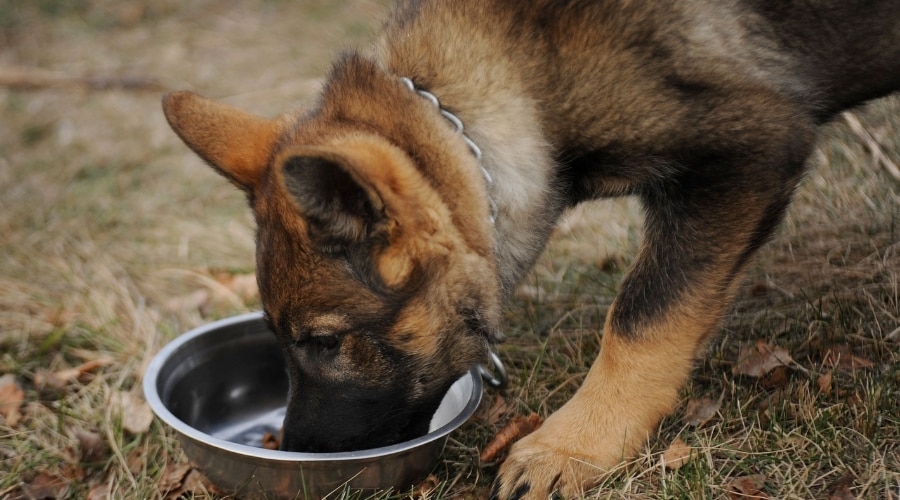
Like all dogs, German Shepherds are primarily meat-eaters. So, your German Shepherd’s diet should comprise mostly dry dog food that’s specifically made for German Shepherds with high protein levels. Protein is an essential dietary component for muscular development, energy requirements, and healthy growth. Adult German Shepherds need between 20% to 25% protein in their diet.
Your dog’s diet should also contain an amount of fat to keep his skin and coat in good condition. As your German Shepherd grows from a puppy to adulthood, his diet will change according to his age and activity levels.
German Shepherd puppies actually need more nutrition than their adult counterparts. These pups are livewires who spend their days checking out their environment, playing, and generally getting into mischief! These high activity levels demand lots of fuel to fulfill the puppy’s energy requirements, as well as support healthy growth and development.
Once your German Shepherd puppy is one year old, you should gradually move him onto an adult diet that’s formulated especially for the needs of large breed dogs. When you collect your puppy, it’s a sensible idea to ask the breeder what food they recommend for your pup and keep to that brand of food for at least the first six months.
Some dogs require specific dietary requirements, so be sure to check with your vet about the right food for your dog. If you want to simplify feeding in your home, our experts review fresh dog food, raw food, and food delivery options.
Grooming

Expect to spend anywhere around $1,000, sometimes even more, on a purebred German Shepherd puppy. German Shepherds are nicknamed “German shedders.” That should give you a big clue about the breed’s grooming requirements! Your German Shepherd needs brushing at least three times every week and daily during your dog’s twice-yearly shedding periods that occur in the spring and fall.
Shedding takes place to rid the dog of his thick winter coat so that he won’t get too hot when the summer weather arrives. The autumn shedding is necessary to remove the summer undercoat, replacing it with a thick, warm layer of fluffy fur to keep the dog warm in the wintertime.
The best brush for a German Shepherd is a shedding brush. Bathing is another essential part of grooming, but be cautious not to over-bathe this breed because it can result in oil depletion from the skin, exacerbating skin conditions such as eczema.
Weekly teeth brushing and nail trimming are also essential parts of grooming a German Shepherd.
Breeders & Puppy Costs
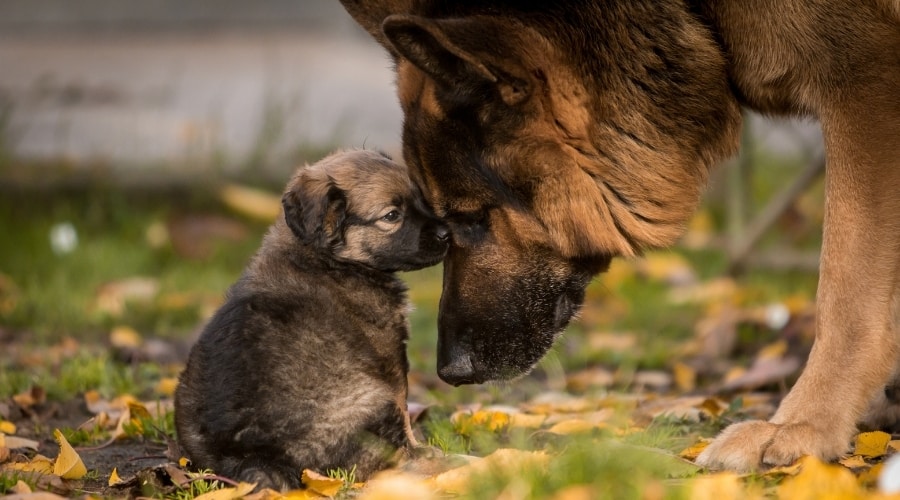
Expect to spend anywhere around $1,000, sometimes even more, on a purebred German Shepherd puppy. A good place to start your search for a German Shepherd puppy is on the website of the German Shepherd Dog Club of America. Always choose a breeder who respects the club’s code of conduct that doesn’t allow the sale of puppies through brokers, commercial dealers such as pet stores, or at auctions.
When you buy a puppy, a good breeder should provide you with a written contract that guarantees they will take the dog back at any time during the animal’s lifetime if you’re unable to keep him. You should also receive written confirmation that the puppy’s parents and grandparents have the requisite temperament and health certificates.
Look for a breeder whose dogs have won titles in sports rather than just in the show ring. Make sure you are prepared to bring your German Shepherd puppy home with the perfect name for your pup.
Cheap German Shepherd puppies are often offered for sale by puppy mills. These operations are purely run on a commercial basis, producing many puppies as cheaply and quickly as possible. Usually, the breeding animals have not been health screened, and puppies from these enterprises often have inherited health conditions and may even be carrying disease or a heavy worm burden from day one. Many pet stores buy their puppies for a cheap wholesale price from puppy mills.
The price of a German Shepherd puppy varies depending on where you are in the country, the sex of the puppy, what titles are held by his parents, and whether the pup has been bred for the show ring or for a forever pet home.
Good quality, well-bred puppies typically cost from $800 to $1,500. However, some animals with an excellent show pedigree in their bloodlines can command prices of up to $4,500.
Rescue & Shelters
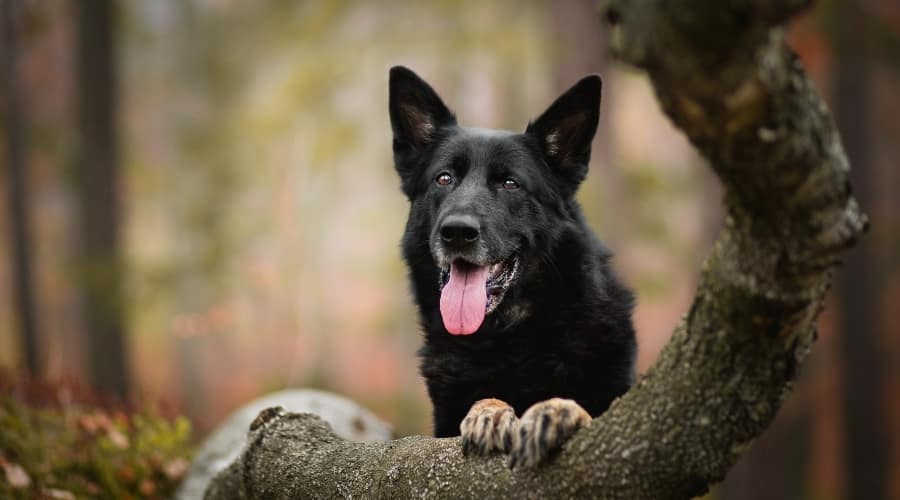
If you are happy to rehome a German Shepherd from a rescue shelter, you may want to check out this link to the GSDCA’s rescue arm. Also, Petfinder is a very useful resource where you might find your perfect pet.
Be careful to find out as much as you can about the German Shepherd you’re considering adopting. Many dogs from rescue shelters don’t come with any history, so, to some extent, you’re taking a risk at getting a pup with some health or behavioral issues.
It may be possible to take an adult dog from a shelter on a trial basis. If the dog settles well and you’re confident he’ll make a great addition to your family, you can go ahead and adopt him. If not, you have the guarantee of being able to return the dog to the shelter.
German Shepherd Mixes
Because of their popularity, German Shepherds have become extremely popular as “designer dogs,” meaning that they are often crossed with other purebred dogs to obtain a “new breed” of dog. Some people may consider these “mutts,” but designer dogs are becoming a more popular phenomenon. Here are some popular German Shepherd mixes you may come across in a shelter or a designer dog breeder:
- German Shepherd Labrador Retriever Mix
- Siberian Husky German Shepherd Mix
- The Shepweiler
- Chow and German Shepherd Mix
- Shiloh Shepherd Dogs
- GSD Beagle Mix
- German Shepherd Pit Bull Mix
- German Shepherd Golden Retriever Mix
- Bernese Shepherd
- Dachshund Shepherd
- Great Pyrenees GSD mix
Many dogs look like German Shepherds, so it is easy to confuse a GSD or GSD mix for other large, thick-coated breeds.
German Shepherds In The White House
This two-and-a-half-minute video from Good Morning America talks about the two German Shepherds, Champ, and Major, living in the White House with President Biden.
As Family Pets
So, based on what you’ve learned so far, would a German Shepherd make the perfect canine companion for your family? If you want to do a little more research, check out The German Shepherd Handbook. If you’re not sure about this breed, our article on the most popular dog breeds may help you narrow down a breed that would be more suitable to your and your future pup’s needs. And, if you’ve already decided a GSD is right for you, check out these 200 ideas for German Shepherd names.
German Shepherds are big dogs, so you need a house with plenty of space, and ideally, you’ll have a large backyard, too. GSDs need larger everything, including beds, blankets, leashes, collars, and harnesses.
Most German Shepherds shed continually and have two major seasonal shedding periods each year. Because German Shepherds are heavy shedders, the breed is not the best choice for a home with allergy sufferers.
Well-socialized German Shepherds get along with other pets, including cats. GSDs typically get along very well with kids of all ages. They are very protective of their human family and make great watchdogs. However, you must remember that these are big dogs and can easily knock a small toddler off his or her feet, albeit unintentionally.
German Shepherds need lots of exercise and variety to keep them happy. Don’t take on one of these pups if you don’t enjoy walking.
Have you had a German Shepherd as a pet? I’d love to hear about your experience with this mighty breed in the comments.
Other Breeds To Consider
GSDs are a wonderful breed but they are not right for everyone. If you aren’t ready for such a high-energy dog, or if you live in a small home, a few of the breeds might be a better fit. For those looking for a calmer and smaller pup, a Cavalier King Charles Spaniel, Pug, or Shih Tzu are much mellower picks.
Why Trust Canine Journal?
Danielle has shared a special bond with animals since childhood. She has over 30 years of experience with canine breeds of all sizes, from toy to giant. She has direct experience with pets that have special medical needs, including deafness, dementia, cancer, kidney disease, heart disease, and epilepsy. Danielle is also a dedicated professional researcher and pet product reviewer. She spends countless hours researching the latest pet care, health, food, and training developments to help owners learn what’s behind the label. Danielle works with a professional and experienced team to bring our readers the best, most accurate, and up-to-date information to better the lives of pets and people.

